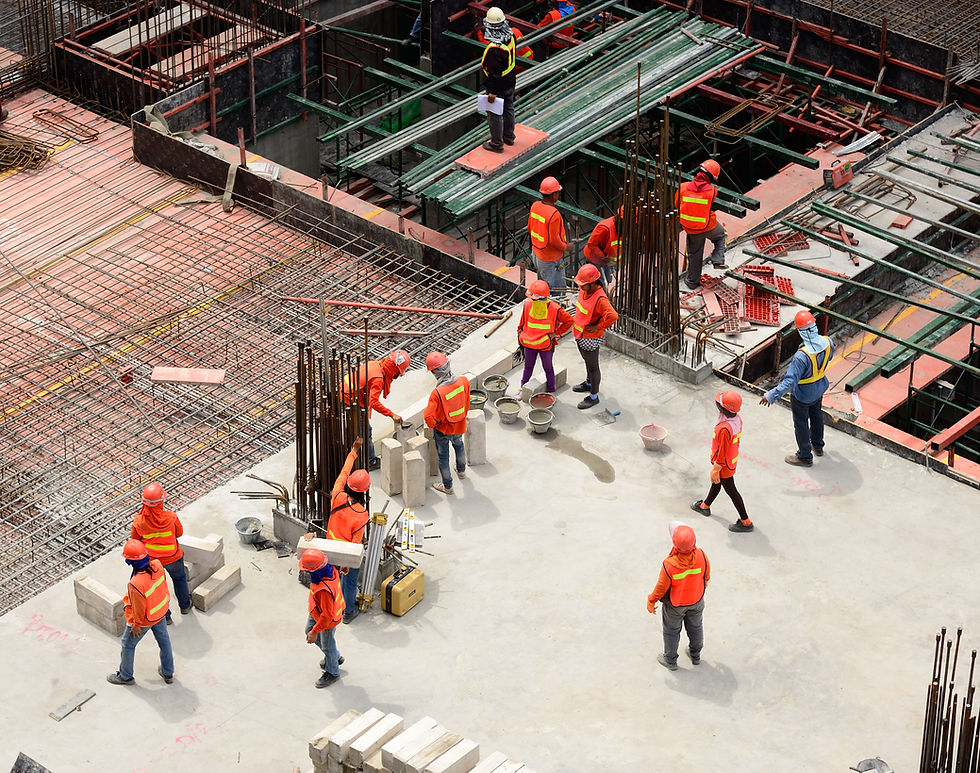Top 3 Systems for a Stress-Free Construction Business
- Julleona Marin
- Dec 21, 2023
- 3 min read
Navigating the complexities of construction projects can be a daunting task. As businesses strive for excellence, the importance of streamlined systems becomes evident. Investing in the right tools not only enhances efficiency, it can also reduces stress. We all know that the construction industry is fraught with stress, however there are ways to manage it during your construction process. In this blog, we explore the top three systems crucial for a "stress-free" construction business.
1. Project Management Software
Project management lies at the heart of successful construction ventures. The integration of cutting-edge project management software brings a paradigm shift to the way teams collaborate, communicate, and execute tasks. There are benefits of using project management software. Here's a few:
Improved Communication and Collaboration
Effective communication is the cornerstone of any successful project. Project management software, such as Procore, Buildertrend, and CoConstruct, facilitates seamless communication and collaboration among team members. Real-time updates, file sharing, and centralized communication channels ensure everyone is on the same page, minimizing misunderstandings and delays.
Efficient Task and Schedule Management
Keeping projects on schedule is an ongoing challenge in the construction industry. These software solutions offer advanced scheduling tools, enabling precise task management and timeline tracking. With features like Gantt charts and task dependencies, teams can efficiently allocate resources, optimize workflows, and mitigate potential delays.

Real-Time Project Tracking and Reporting
Transparent project tracking is essential for informed decision-making. Modern project management software provides real-time updates on project progress, budget adherence, and potential risks. Detailed reporting features empower stakeholders to make data-driven decisions, fostering a proactive and agile approach to project management.
2. Accounting and Financial Management Tools
Beyond project execution, financial management plays a pivotal role in the success of construction businesses. Leveraging specialized accounting software is instrumental in maintaining financial stability and ensuring the profitability of projects.
Budget Tracking and Cost Control
Construction projects are notorious for budget overruns. Accounting software, such as QuickBooks for Contractors, Sage 100 Contractor, and Viewpoint Spectrum, offer robust budget tracking and cost control features. Real-time insights into project expenses enable businesses to identify cost discrepancies early on, allowing for timely adjustments and cost-effective decision-making.
Invoice and Payment Management
Streamlining invoicing and payment processes is crucial for maintaining healthy cash flow. These tools automate invoicing, ensuring accurate and timely billing. Additionally, they facilitate efficient payment tracking, reducing the risk of late payments and improving overall financial predictability.
Financial Reporting and Analysis
Comprehensive financial reporting and analysis tools empower construction businesses to assess their financial health. By generating detailed reports on profitability, cash flow, and project-specific financial metrics, these tools enable businesses to make informed strategic decisions for sustained growth.
3. Building Information Modeling (BIM) Technology
This is the area that intrigues me the most and baffles me at the same time. There are so many amazing things going on in our industry and I can't even begin to wrap my head around all the potential. In the digital era, Building Information Modeling (BIM) technology emerged as a game-changer for construction projects, offering unparalleled benefits in terms of visualization, planning, and collaboration.

Enhanced Visualization and Planning
BIM technology allows construction professionals to create detailed 3D models of buildings and infrastructure. This not only aids in visualizing the final product but also facilitates better planning and coordination among different stakeholders.
Clash Detection and Risk Mitigation
Identifying clashes and potential issues before construction begins is critical. BIM technology enables clash detection, helping teams identify and resolve conflicts in the design phase, reducing the likelihood of costly rework during construction.
Improved Communication Among Stakeholders
BIM fosters collaboration by providing a centralized platform for sharing project information. Architects, engineers, contractors, and other stakeholders can access and contribute to a shared model, fostering a collaborative and transparent working environment.
Constructing a "Stress-Free" Future
The construction industry has been historically slow on the uptake of new technology. We are tenacious , hard-working people and often prefer for things to be hard (because we know we can do it) rather than make the time to learn a new skill.
However, integrating project management software, advanced accounting tools, and BIM technology can simplify our lives and improve our business performance so much that is behooves us not to take a step into the forum of what's possible. This technology is essential for reducing stress in our business, driving efficiency, collaboration, and overall success. In the competitive construction landscape, these tools are strategic imperatives, not just options, for long-term prosperity.
For personalized guidance, connect with Coralee Beatty, a fractional COO, and experienced business consultant, to unlock your business's full potential and pave the way for a "stress-free" construction future. Contact us today, and let your success story begin.








Comments